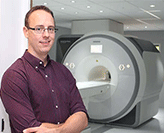Stroke trial lures imaging research expert
The Hunter's renowned stroke research group is to be bolstered by the return of award-winning imaging expert Dr Andrew Bivard to work on acute care and rehabilitation projects.

Dr Bivard completed his Honours degree under neurologist Professor Mark Parsons at the University of Newcastle and has worked for the past two years at the University of Melbourne.
With three-year funding support from the Greater Charitable Foundation he will work on an HMRI clinical trial of the clot-busting drug Tenecteplase over the standard treatment Alteplase.
The TASTE (Tenecteplase versus Alteplase for Stroke Thrombolysis Evaluation) study, led by Professor Parsons, will involve 20 stroke centres around Australia and 50 world-wide.
Dr Bivard worked on the initial Phase II clot-busting trial, which showed promising outcomes for patients treated with the newer therapy.
"I previously worked on deriving the thresholds to treat a patient with Tenecteplase as part of the trial selection criteria," he said. "This time, I'll be analysing the scans and computing the data."
Having access to a new research-dedicated Magnetic Resonance Imaging scanner at the HMRI Building was a major drawcard for Dr Bivard.
"So many clinicians are using hospital facilities that I'd wait anywhere from two weeks to eight months to get a research scan done, whereas at HMRI we should be able to get it within 24 hours."
The 27-year-old won two prestigious awards in 2013, including being named the European Stroke Conference Young Investigator of the Year for a unique rehabilitation project using Magnetic Resonance Spectroscopy.
Dr Bivard examined the chemical composition of the brain after acute stroke treatment and found a signature in patients who were likely to excel in their recovery. He will be resuming that project from June this year with a Phase II trial.
The Stroke Society of Australasia awarded Dr Bivard its Young Investigator award last August for using contrast-free perfusion imaging in acute stroke.
"We no longer need to inject a patient with a contrast dye," Dr Bivard explained. "This is important because the contrast medium can induce a severe allergic reaction, or if people have kidney dysfunction the contrast can prove fatal.
"Where we used to screen them for kidney function or query their allergic history, now we can treat the patient more rapidly and still get the same quality of data.
"I'm looking forward to returning to Newcastle because it offers a lot of resources and we're going to be kicking on with some pretty interesting projects."
* HMRI is a partnership between the University of Newcastle, Hunter New England Health and the community.
Contact
- Mark Rothfield, HMRI.
- Phone: 4042 0590 | 0487 617 055.
Related news
- Newcastle team on mission to improve childhood cancer outcomes
- Shanae’s passion for caring delivers her dream to work in health
- Food and nutrition degree serves Keren a rewarding career
- Kicking goals on and off the field, Joeli proves you can do it all
- Proving age is just a number, Arlyn wants to inspire more women in their 50s to pursue education
The University of Newcastle acknowledges the traditional custodians of the lands within our footprint areas: Awabakal, Darkinjung, Biripai, Worimi, Wonnarua, and Eora Nations. We also pay respect to the wisdom of our Elders past and present.